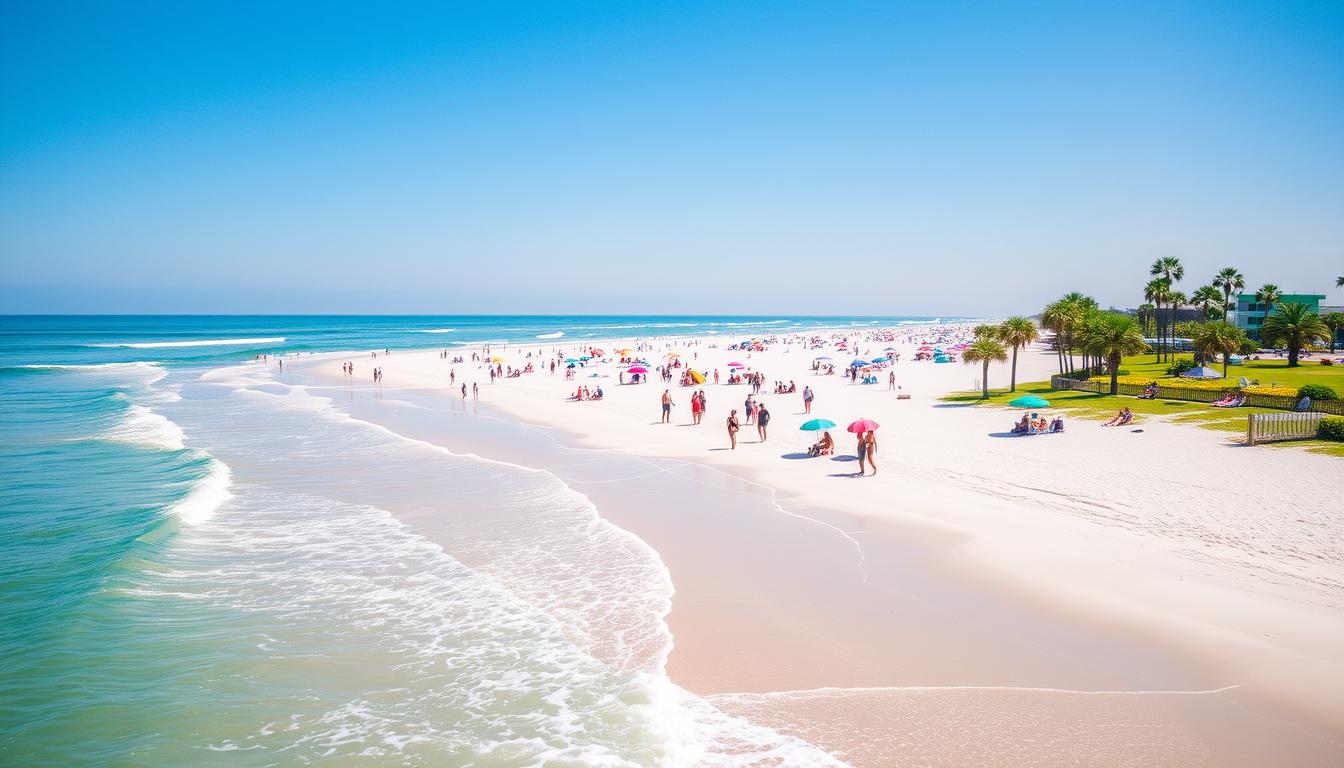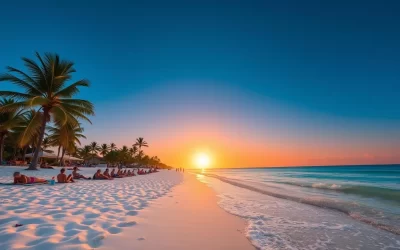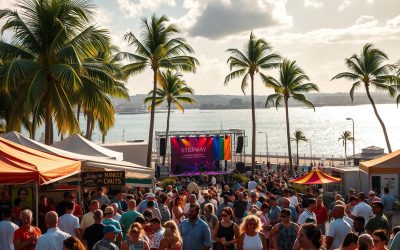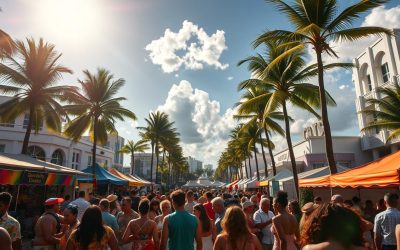Planning a trip to Jacksonville, Florida? September and October are the best months. This coastal city has a great climate during these autumn months.
Expect warm temperatures and comfortable humidity. You can enjoy outdoor activities without the summer’s heat and storms. Plus, you’ll find fewer crowds at popular spots, perfect for exploring the city’s history and culture.
Visiting in autumn also saves money. Lodging prices are lower than in summer. This makes your trip more affordable and budget-friendly.
Key Takeaways
- September and October offer the best weather for a trip to Jacksonville, Florida.
- Warm temperatures and comfortable humidity levels make outdoor activities enjoyable.
- Reduced crowds at attractions and lower lodging prices make autumn a more economical choice.
- Jacksonville’s proximity to the Atlantic Ocean and coastal location contribute to its favorable climate.
- Careful planning around potential weather events, such as hurricanes, is essential for a successful vacation.
Understanding Jacksonville’s Climate Patterns
Planning a trip to Jacksonville, Florida? Knowing the city’s climate is key. This coastal spot has temperature averages, rainfall patterns, and humidity levels that shape your visit.
Seasonal Temperature Variations
Jacksonville’s weather is hot and humid in summer, mild in winter. Summer highs can hit the low 90s Fahrenheit. But, thunderstorms in the afternoon cool things down.
Winters are milder, with highs in the 60s Fahrenheit. Sometimes, cold air brings temperatures into the 40s Fahrenheit.
Humidity Levels Throughout the Year
Jacksonville’s close to the Atlantic Ocean and is low-lying. This means high humidity levels all year. Summer is the most humid, with humidity over 70%.
Even in winter, humidity stays high, between 60-70%.
Rainfall Distribution Patterns
Jacksonville’s rainfall patterns change with the seasons. The wettest times are late winter, early spring, and summer. The city gets less than 40 inches of rain a year.
October and November are the driest months. But, be ready for sudden rain and thunderstorms any time of year.
Understanding Jacksonville’s climate helps plan your trip. Whether you want beach days or green space adventures, knowing the weather ensures a great vacation.
Peak Tourist Seasons vs. Weather-Smart Travel Times
Planning your trip to Jacksonville, Florida, means balancing peak tourist seasons and the best weather times. The city’s main tourist season is from mid-December to mid-April. February is especially popular for its mild weather and sunny beaches. But, this time also means higher prices for flights and hotels.
For those who love good weather, September and October are great months to visit Jacksonville. These months have nice weather, with highs from 70 to 85 degrees Fahrenheit. They also have lower humidity and fewer people around. It’s a perfect time to enjoy the city’s art, trendy spots, and outdoor fun without the high costs and crowds of peak season.
| Month | Average High | Crowds | Hotel Rates |
|---|---|---|---|
| January | 65°F | Low | Low |
| February | 70°F | Low | Low |
| March | 70-75°F | Moderate | Moderate |
| April | 80°F | Moderate | Moderate |
| September | 85°F | Low | Low |
| October | 80°F | Low | Low |
By choosing the best months for your trip, you can enjoy Jacksonville’s mild weather, fewer crowds, and lower travel costs.
Summer Weather in Jacksonville: What to Expect
Summers in Jacksonville, Florida are long, warm, and humid. The heat and humidity can be intense. Temperatures often reach the high 80s or even 90s Fahrenheit.
The “feels like” temperature, including humidity, can be even higher. This makes summer weather challenging to manage.
Managing Summer Heat and Humidity
To beat the summer heat and humidity, stay hydrated. Wear lightweight and breathable clothing. Seek shade or air-conditioned spaces when possible.
Apply sunscreen and wear a hat to protect against the sun’s harmful rays. Avoid strenuous outdoor activities during the hottest parts of the day. This helps you stay cool and comfortable.
Afternoon Thunderstorms and Planning
Afternoon thunderstorms are a defining feature of Jacksonville’s summer weather. These storms can roll in quickly. They bring a sudden drop in temperature of 10-20 degrees Fahrenheit.
When planning outdoor activities, keep an eye on the weather forecast. Have a backup plan in case a thunderstorm interrupts your plans.
Beach Weather Conditions
The beaches in Jacksonville are generally favorable during the summer. They have warm water temperatures and plenty of sunshine. However, the afternoon thunderstorms can impact beach conditions.
It’s important to be prepared for sudden changes in the weather. Check the forecast and be aware of rip currents and other potential hazards. This helps ensure a safe and enjoyable beach day.
“Summertime in Jacksonville is all about embracing the heat, humidity, and the occasional thunderstorm. With a little preparation and flexibility, you can make the most of the beach, outdoor activities, and the city’s vibrant summer events.”
Winter Months in Jacksonville: A Mild Escape
If you’re tired of cold winter weather, Jacksonville, Florida, is a great place to escape. While the rest of the country faces freezing temperatures and snow, Jacksonville stays mild and pleasant. This makes it a perfect spot for a winter getaway.
In February, Jacksonville’s average high is a cozy 67°F (19°C). The lows drop to a comfortable 44°F (7°C). This weather is perfect for outdoor fun without needing heavy coats.
Winter in Jacksonville is also drier than summer, with less rain. This is great for visiting the beaches and trying water sports. The ocean temperatures in February are cool, ranging from 50-60°F (10-20°C). This offers a nice contrast to the air’s chill.
| City | Average High (°F/°C) | Average Low (°F/°C) |
|---|---|---|
| Daytona Beach | 70°F (21°C) | 47°F (8°C) |
| Fort Myers | 75°F (24°C) | 54°F (12°C) |
| Jacksonville | 64°F (18°C) | 42°F (6°C) |
| Key West | 75°F (24°C) | 65°F (18°C) |
| Miami | 73°F (23°C) | 63°F (17°C) |
While Jacksonville’s winter is generally mild, cold fronts can bring cooler temperatures. These brief cold snaps add to the city’s charm, offering a nice contrast to the warmer days.
Looking to get away from winter’s chill or enjoy a beautiful coastal spot? Jacksonville is a mild and inviting winter escape for all ages.
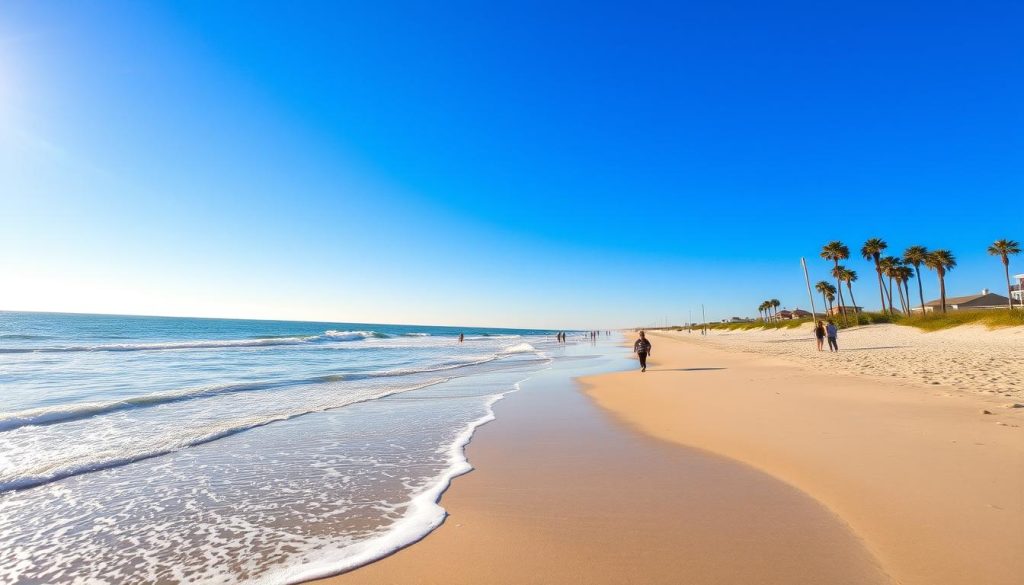
Jacksonville, Florida: Best Months for a Weather-Savvy Trip
Planning a trip to Jacksonville, Florida? September, October, and spring are the best times. They offer comfortable temperatures, low humidity, and fewer rainy days. This makes them perfect for outdoor fun and exploring the city.
September and October Benefits
September and October bring a welcome break from summer’s heat. Temperatures are in the low 80s to mid-70s, ideal for outdoor activities. The humidity is also lower, making it more enjoyable to explore the city.
Whether you’re walking by the river, hiking trails, or visiting the zoo, these months are great. You’ll find it easier to enjoy the outdoors without the heat.
Spring Weather Advantages
Spring in Jacksonville is mild and sunny. Temperatures are in the 70s and 80s, perfect for outdoor lovers. You can explore parks, trails, and more without the summer heat.
Spring also brings beautiful flowers and lively events like The Players Championship. It’s a great time to see Jacksonville’s best.
Optimal Outdoor Activity Periods
- September and October: Ideal for hiking, biking, and enjoying the city’s 1,100 miles of navigable waterways.
- Spring months: Perfect for golfing, attending outdoor festivals, and exploring the Riverside/Avondale district’s historic charm.
Looking for a weather-savvy vacation or outdoor adventures in Jacksonville? These months offer the best of both worlds. You’ll enjoy comfortable weather and plenty of activities.
Hurricane Season Considerations
When planning your trip to Jacksonville, Florida, remember the hurricane season. It runs from June 1 to November 30. This makes the area prone to tropical storms and hurricanes during these months.
While hurricanes can happen anytime, they’re rare outside the season. Jacksonville’s coastal spot on the Atlantic makes it vulnerable. It’s key to know the risks and plan well.
- The peak of hurricane season is from August to October. This is when storms are most likely in the area.
- The historic Castillo de San Marcos National Monument in St. Augustine has faced over 350 years of attacks and hurricanes. It shows the area’s strength.
- The Nights of Lights in St. Augustine, with over two million lights, happens from late November to January. It avoids the busiest hurricane months.
Visiting Jacksonville in hurricane season? Keep an eye on the weather. Have a plan for evacuation or shelter. Be ready to change your plans if needed. Knowing the weather patterns helps make your trip safe and fun.
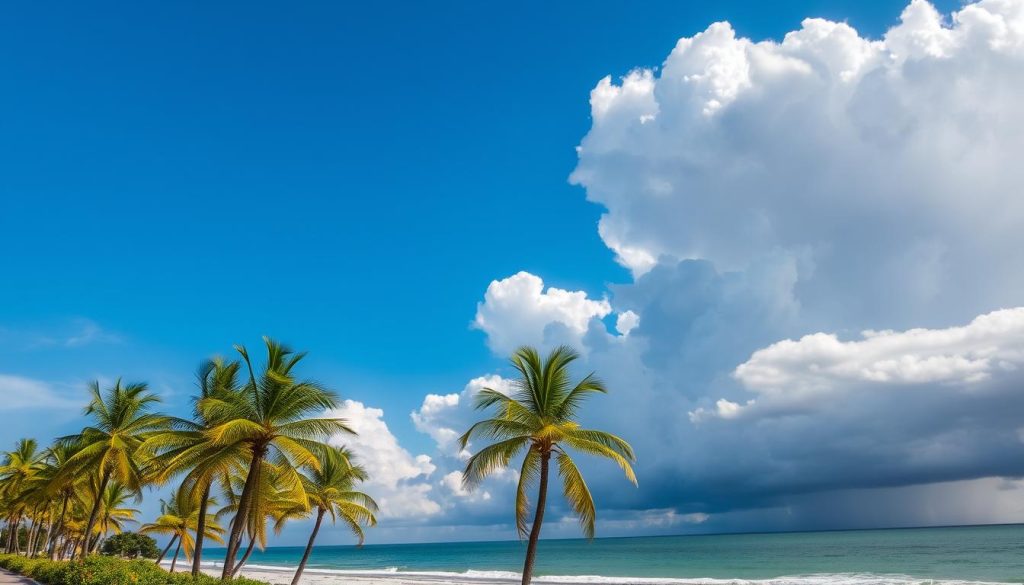
Best Times for Beach Activities
Jacksonville’s beaches are a sunny escape all year. But, the best times for fun vary with water temps, weather, and crowds. Knowing the best seasons and conditions helps plan a great trip.
Water Temperature Guide
Jacksonville’s beaches are popular all year, but water temps change with the seasons. In winter, the Atlantic stays above 50°F (10°C), great for walks and cool activities. Summer brings warmer water, reaching the mid-80s°F (around 29°C) for swimming and sports.
Beach Safety Tips
- Watch out for rip currents, which can pull you away. Swim parallel to the shore to get out.
- Check beach flags and warnings for surf and weather. Always listen to lifeguards.
- Stay in the shade and drink water in summer, when it’s hot and humid.
- Use sunscreen and wear a hat or sunglasses to avoid sunburn.
Popular Beach Destinations
| Beach Destination | Ratings | Highlights |
|---|---|---|
| Jacksonville Beach | 4.5 | Beachfront pier, lively boardwalk, and close to downtown Jacksonville. |
| Neptune Beach | 4.2 | Quaint vibe, vibrant arts and dining. |
| Atlantic Beach | 4.0 | Laid-back, perfect for families and outdoor lovers. |
“The sound of the waves, the sand between your toes, and the sun’s warmth – nothing beats a day at Jacksonville’s beach.”
Planning Around Major Weather Events
Traveling to Jacksonville, Florida, means knowing about the weather. The city’s weather can change a lot, so planning is key. Each season brings different weather events that need special attention.
Summer in Jacksonville means lots of thunderstorms. These storms can ruin your plans for outdoor fun. It’s smart to carry an umbrella and be ready to change your plans. Plus, the city’s location makes it a hotspot for lightning, which is dangerous.
Winter in Jacksonville can get cold. Temperatures drop, affecting what you wear and do. Keep an eye on the weather forecast and pack warm clothes for these times.
Tornadoes are a big worry in Jacksonville, especially in spring and summer. Always check for tornado warnings and have a safe place to go if needed.
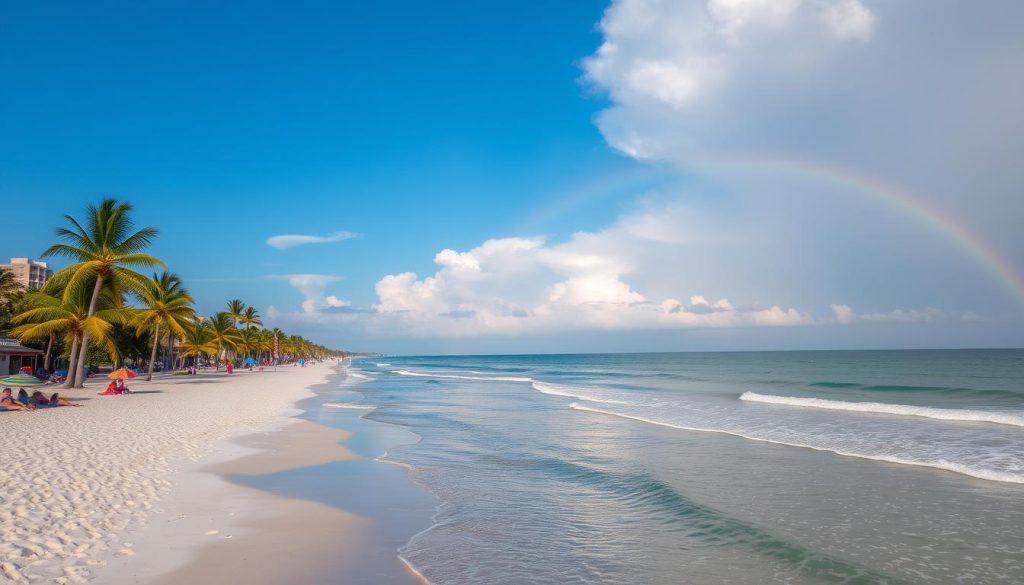
By planning for these weather events, your trip to Jacksonville can be great, no matter the weather. Being flexible, prepared, and watching the forecast will help you enjoy the city’s weather.
Temperature Comparison by Season
Planning a trip to Jacksonville, Florida? Knowing the temperature patterns by season is key. The city’s climate patterns change a lot, offering different experiences all year.
Summer in Jacksonville sees highs around 90°F (32°C). The humidity makes it feel even hotter. But, the warm weather is perfect for beach fun and outdoor adventures.
Winter brings cooler temperatures, with lows in the mid-40s°F (around 7°C). This cooler weather is a nice break from summer’s heat. It’s great for those who prefer milder climates.
Spring and fall offer a nice middle ground, with temperatures from the mid-60s to mid-80s°F (18-29°C). These seasons are ideal for visiting, with comfortable weather and fewer crowds.
| Season | Average High Temperature | Average Low Temperature |
|---|---|---|
| Summer | 90°F (32°C) | 70°F (21°C) |
| Winter | 65°F (18°C) | 45°F (7°C) |
| Spring | 75°F (24°C) | 55°F (13°C) |
| Fall | 80°F (27°C) | 60°F (16°C) |
Understanding Jacksonville’s seasonal temperatures and climate patterns helps plan your trip. You can choose the best weather for your activities.
Packing Tips Based on Weather Patterns
When planning a trip to Jacksonville, Florida, it’s key to pack smart. The city’s weather changes a lot, from warm and humid summers to mild winters. With the right clothes, you’ll have a smooth and weather-ready trip.
Essential Weather Gear
In summer, wear light, airy clothes to beat the heat and humidity. Don’t forget sunscreen, sunglasses, and a hat for sun protection. Also, pack a light rain jacket or umbrella for sudden storms.
In winter, wear layers that you can add or remove. A light jacket or sweater is good for cool nights. For colder days, bring warmer clothes. Comfortable shoes are a must, especially on rainy days.
Seasonal Wardrobe Guidelines
- Summer (June-August): Pack light, breathable fabrics, shorts, t-shirts, and sandals. Bring a swimsuit for the beaches and pool.
- Winter (December-February): Include long pants, long-sleeved shirts, sweaters, and a light jacket or coat. Closed-toe shoes are recommended.
- Spring (March-May) and Fall (September-November): Bring a mix of warm and cool weather clothing, such as jeans, long-sleeved tops, and a light jacket or cardigan.
Always pack sunglasses and a hat for sun protection. Also, wear the right shoes for each season to stay comfortable in Jacksonville.
| Season | Average Temperature | Recommended Packing |
|---|---|---|
| Summer (June-August) | 90°F (32°C) | Lightweight, breathable fabrics, shorts, t-shirts, sandals, swimsuit |
| Winter (December-February) | 64°F (18°C) | Long pants, long-sleeved shirts, sweaters, light jacket or coat, closed-toe shoes |
| Spring (March-May) and Fall (September-November) | Varies | Mix of warm and cool weather clothing, jeans, long-sleeved tops, light jacket or cardigan |
By packing the right gear and following these tips, you’ll be ready for anything Jacksonville throws your way, no matter the season.
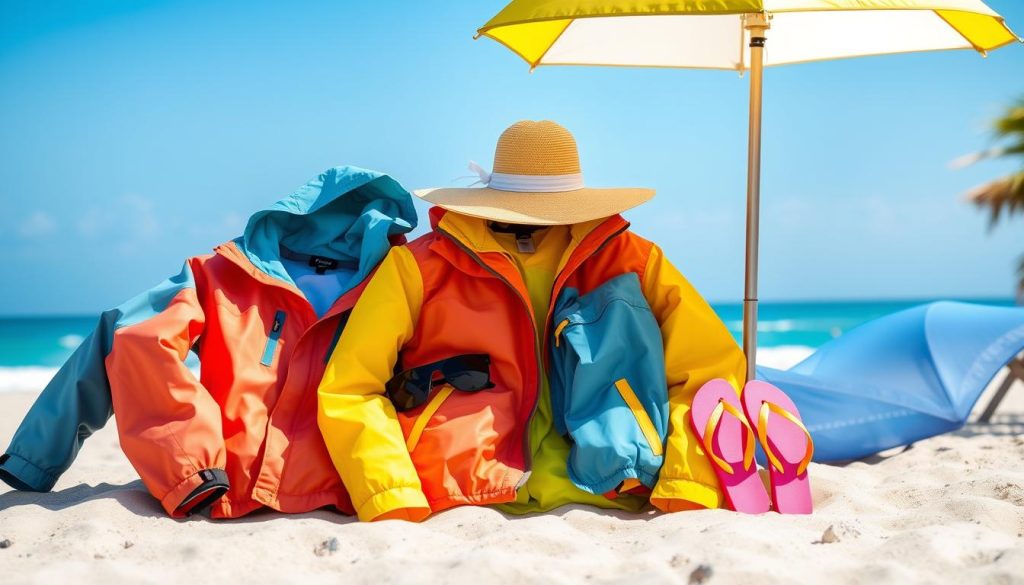
Weather Impact on Local Attractions
Jacksonville’s weather greatly affects the city’s attractions and outdoor activities. In the summer, the heat and humidity can make it hard to enjoy the outdoors. But, the mild winters let you golf, hike, and explore parks, beaches, and riverwalks all year.
When the weather gets too hot or rainy, indoor spots like museums and shopping centers are great. These places stay cool and dry, letting you enjoy the city’s culture no matter the weather outside.
Knowing the weather and planning your activities can help you have a great time in Jacksonville. Whether you want to be outside or indoors, the city has something for everyone, no matter the weather.
The above is subject to change.
Check back often to TRAVEL.COM for the latest travel tips and deals.
Here are some Tours & Sightseeing suggestions that might pique your interests!
